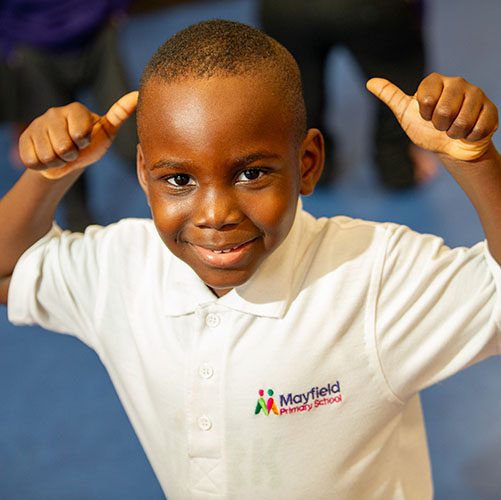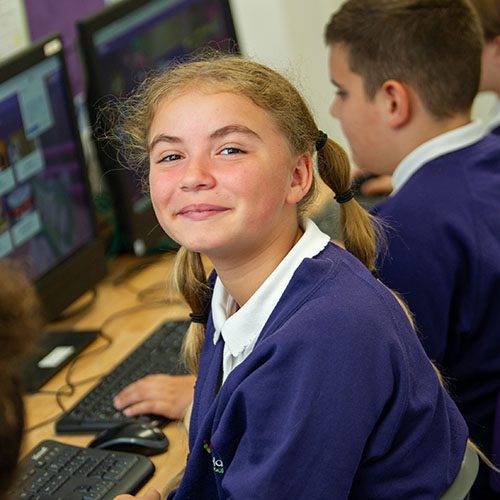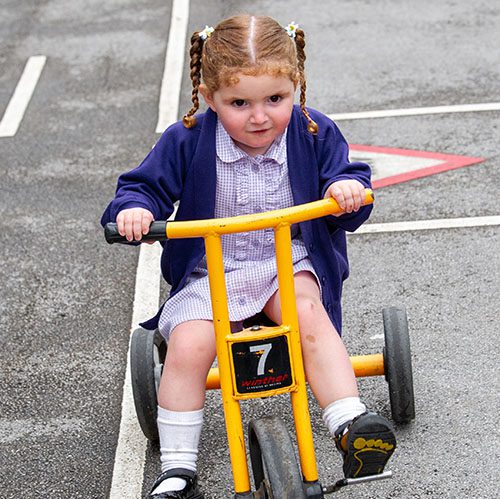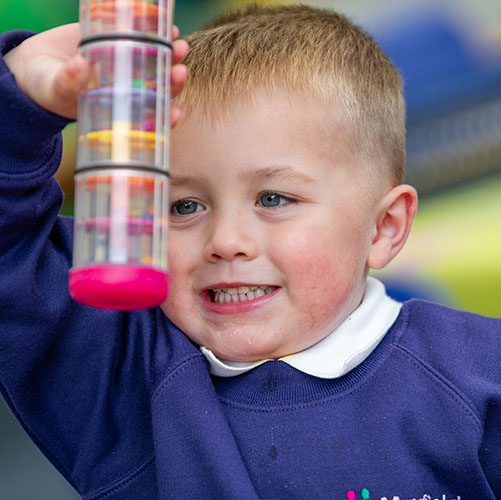Religious Education
Religious Education (RE) is understanding beliefs across the world
Vision for RE (Intent)
At Mayfield our Religious Education curriculum has been designed to build and broaden children’s knowledge and understanding of what it means to have a belief, and the impact of religion on individuals, families and communities. At Mayfield, we believe in the importance and significance of children being aware and having a secure understanding of religion, culture and diversity, not only of those around them but also in the wider community. Through a broad, balanced and progressive RE curriculum our children are given the opportunity to ask questions, evaluate and develop their knowledge and understanding of religions, beliefs, values and traditions. Along with this, we believe it is imperative that all children reflect on their own beliefs, values and experiences, promoting respect and a non-judgemental attitude, whilst allowing our children to flourish individually, in their communities and as citizens in an ever-changing society.


RE Subject Leaders- Mrs Sutcliffe & Mr Stevens
Long Term Plan
|
|
Long Term Plan
|
Key Vocabulary
|
|
RE Vocabulary
|
The aims for implementation of our curriculum for RE at Mayfield
At Mayfield we have implemented the Oldham Religious Education Agreed Syllabus 2020-2025 as the chosen approach due to the reflection and representation of our community in Oldham.
The principal aim of our religious education curriculum is to explore what people believe and what difference this makes to how they live, so that pupils can gain the knowledge, understanding and skills needed to handle questions raised by religion and belief, reflecting on their own ideas and ways of living.
The threefold aim of RE elaborates this principal aim and puts the purpose of the subject into action.
The curriculum for RE aims to ensure that all pupils:
1.Make sense of a range of religious and non-religious beliefs, so that they can:
- identify, describe, explain and analyse beliefs and concepts in the context of living religions, using appropriate vocabulary;
- explain how and why these beliefs are understood in different ways, by individuals and within communities;
- recognise how and why sources of authority (e.g. texts, teachings, traditions, leaders) are used, expressed and interpreted in different ways, developing skills of interpretation
2.Understand the impact and significance of religious and non-religious beliefs, so that they can:
- examine and explain how and why people express their beliefs in diverse ways;
- recognise and account for ways in which people put their beliefs into action in diverse ways, in their everyday lives, within their communities and in the wider world;
- appreciate and appraise the significance of different ways of life and ways of expressing meaning.
3.Make connections between religious and non-religious beliefs, concepts, practices and ideas studied, so that they can:
- evaluate, reflect on and enquire into key concepts and questions studied, responding thoughtfully and creatively, giving good reasons for their responses;
- challenge the ideas they study, and consider how these ideas might challenge their own thinking, articulating beliefs, values and commitments clearly in response;
- discern possible connections between the ideas studied and their own ways of understanding the world, expressing their critical responses and personal reflections with increasing clarity and understanding.
How is RE taught and what does it look like at Mayfield? (Implementation)
At Mayfield Primary School, we recognise the importance of RE in every aspect of our lives and those of our community. We have implemented the Oldham Religious Education Agreed Syllabus 2020-2025 as the chosen approach due to the reflection and representation of our community in Oldham.
At Mayfield, RE is taught through a timetabled lesson each week. Each year group covers six units throughout the academic year, building upon their knowledge and learning of Christianity – year on year – as well as learning about other religions such as:
- Islam
- Hinduism
- Judaism
- Humanist
This is achieved through a variety of whole-class teaching, group activities and individual tasks. Within these lessons, students will be given the opportunity to consolidate and extend their knowledge as well as use religious texts and artefacts within lessons, visit places of worship and welcome visitors of different faiths into our school.
- In Early Years at Mayfield, Religious Education is fed through the curriculum, both during carpet sessions and child led activities in Continuous Provision. Statements linking to Personal, Social and Emotional Development (PSED) and Understanding the World, enable practitioners to plan for activities and provision that allow our youngest children to; ‘develop a sense of responsibility and membership of a community’, ‘recognise that people have different beliefs and celebrate special times in different ways’ and ‘know some similarities and differences between different religious and cultural communities in this country, drawing on their experiences and what has been read in class amongst many other statements.
- In Key Stage One, children will gain knowledge and experience of the Christian and Islamic religion. Similarly, in Key Stage Two children will focus on Christianity, Hinduism, Judaism, Islam and Humanist. During each Key Stage, children will have investigated and explored twelve question-based units of work where teachers have selected the learning outcome, chosen specific content, wrote individual pupil outcomes and developed their teaching and learning activities.
- In Key Stage One, children are enabled to identify the core beliefs and concepts studied, whilst giving examples of how stories show what people believe and what they mean. Children are taught examples of ways people use stories to guide their beliefs and put their beliefs into action, along with being challenged to ask questions and give good reasons for the views they have, and the connections made.
Fluently following on from these outcomes, in Key Stage Two, children are encouraged to identify and describe core beliefs and concepts studied, make clear links between texts and offer suggestions about what these mean to believers. Children are enabled to make links between teachings, describing how people show their beliefs whilst identifying differences in how people put their values into action. Children are also inspired to ask their own questions and give their opinions as to the practices studied and how these may impact themselves and the world we live in today.
What will my child leave Mayfield knowing, understanding and appreciating in RE? (Impact)
Children will leave Mayfield with a rich and varied experience through the teaching and learning of RE.
Children will confidently identify and understand the beliefs and followings of different religions, understand what it means to be a member of different religions in Britain today and use different artefacts and texts that are common for a variety of religions. Visits to places of worship along with visitors from different faiths support and enhance our children’s RE experiences.
Using a consistent approach across all the year groups, children will acquire the following key skills that not only supports them when learning about RE, but also holistically through the entire curriculum. These skills include investigating, expressing, reflecting, applying, empathising, interpreting, discerning, analysing, synthesising and evaluating.
Outcomes in Knowledge and Understanding books evidence a broad, balanced and in-depth Religious Education curriculum that demonstrates children’s acquisition of the key knowledge and skills acknowledged. Religious Education at Mayfield plays a vital role in the development of children’s cultural, spiritual, moral and social awareness. Year by year, children will build upon their knowledge of Christianity, making connections between other religions and their own beliefs.
Throughout the teaching of RE, children are motivated and have a desire to investigate the diversity of their local community, learn about the impact of their beliefs on daily life, explore ways in which to express themselves effectively and develop respect and compassion for others, particularly those with views differing from their own.

RE Pupil Voice – What do our children think of RE at Mayfield? (Impact)
“I like learning about other religions like the Jewish religion and Hinduism.”
“We understand how other people from other religions pray and where they go to worship.”
“We visited the church at Christmas. We learnt all about the Christmas story form the church ladies.”
“Mrs Mahmood came to talk to us about how she has to wash before she says her prayers. She prays five times and has a special mat. We saw some of the clothes Muslim people wear and Miss Alderson wore a sari.”
“Mr Rosedale visited our class and talked to us about christenings. He showed us how babies and children are baptised. They use a font and have special Holy Water that they put on the baby’s head.”






Mayfield Primary School is proud to be part of the Cranmer Education Trust
Cranmer Education Trust is a company limited by guarantee and an exempt charity registered in England. Company registration number: 07687709. Registered Office: Cranmer Education Trust, c/o The Blue Coat School, Egerton Street, Oldham OL1 3SQ. The website address is www.cranmereducationtrust.com and the phone number 0161 785 5082.



